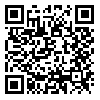Volume 1, Issue 1 (March 2022)
IJER 2022, 1(1): 51-58 |
Back to browse issues page
Download citation:
BibTeX | RIS | EndNote | Medlars | ProCite | Reference Manager | RefWorks
Send citation to:



BibTeX | RIS | EndNote | Medlars | ProCite | Reference Manager | RefWorks
Send citation to:
Bagheri Hoseinabadi F. (2022). Investigating the effectiveness of a motivational interviewing group on academic achievement. IJER. 1(1), 51-58. doi:10.52547/ijer.1.1.51
URL: http://ijer.hormozgan.ac.ir/article-1-25-en.html
URL: http://ijer.hormozgan.ac.ir/article-1-25-en.html
Ph.D. Student, Department of Counseling, University of Hormozgan, Bandar Abbas, Iran , bagheri9977@gmail.com
Abstract: (1921 Views)
The aim of this study was to determine the effectiveness of group motivational interview method on increasing the academic achievement of female students in the second year of high school in Isfahan (Iran). Sampling was available by method. The academic achievement status of 60 students was assessed based on their GPAs and then 32 students with poor (GPA 16-14) and very poor (GPA 10-10) students were selected and assigned to experimental group (16 people) and control group (16 people) randomly. In this study, the experimental group was exposed to motivational counseling but the control group did not receive any intervention. Analysis of covariance was used to analyze the data. Results indicated that motivational interviewing increased academic achievement in post-test (P <0.05). According to the results, school counselors are recommended for improving the academic achievement in high school students through motivational interview.
Type of Study: Original |
Subject:
Educational Studies
Received: 2022/01/5 | Accepted: 2022/02/12 | Published: 2022/03/1
Received: 2022/01/5 | Accepted: 2022/02/12 | Published: 2022/03/1
References
1. Amiri, L., Ebrahimi Moghadam, H., & Babakhani, N. (2019). Structural model of predicting academic engagement based on cognitive ability and socioeconomic status by mediating academic enthusiasm in students [Research]. The Journal Of Psychological Science, 18(74), 215-222. http://psychologicalscience.ir/article-1-92-fa.html
2. Askari, S., kahrizi, S., & Kahrizi, M. (2013). The role of self-efficacy and life satisfaction in predicting academic performance in third grade students in Kermanshah. Journal of School Psychology, 2(2), 107-123. [DOI:d-2-2-92-4-7]
3. Chen, S. M., Creedy, D., Lin, H.-S., & Wollin, J. (2012). Effects of motivational interviewing intervention on self-management, psychological and glycemic outcomes in type 2 diabetes: a randomized controlled trial. International journal of nursing studies, 49(6), 637-644. [DOI:10.1016/j.ijnurstu.2011.11.011]
4. Hosseini, S., Rezaei, A., Kazemi, S., & Samani, S. (2020). The Effectiveness of Motivational Interviewing on Academic Procrastination in Adolescents. Psychological Methods and Models, 11(39), 81-94. https://jpmm.marvdasht.iau.ir/article_4310_6b04e0ecc33977a25c0bd83d05de5c1d.pdf
5. Miller, W. R. (1996). Motivational interviewing: research, practice, and puzzles. Addictive behaviors, 21(6), 835-842. [DOI:10.1016/0306-4603(96)00044-5]
6. Miller, W. R., & Rollnick, S. (2009). Ten things that motivational interviewing is not. Behavioural and cognitive psychotherapy, 37(2), 129-140. [DOI:10.1017/S1352465809005128]
7. Miller, W. R., & Rose, G. S. (2009). Toward a theory of motivational interviewing. American Psychologist, 64(6), 527. [DOI:10.1037/a0016830]
8. Moradi Moghadam, M. (2014). A look at the statistics of the exam results of the academic year 2003. Educational Research Journal of Education and Training Research Institute, 73(1), 35-72.
9. Narimani, M., & Soleymani, E. (2013). The effectivenes of cognitive rehabilitation on executive functions(working memory and attention ) and academic achievement in students with math learning diworder. Journal of learning Disabilities, 2(3), 91-115. https://jld.uma.ac.ir/article_129_e15b17b31b34b0538cb96dfefc3b552c.pdf
10. Pashaei, Z., Pura Brahim, T., & Khoshkonesh, A. (2009). The effect of teaching skills to deal with emotions on exam anxiety and academic performance of high school girls. Journal of Applied Psychology, 3(4), 7-20. https://apsy.sbu.ac.ir/article_95066_9b028c037a29a79f08ae19234bd5669c.pdf
11. Prochaska, J. O., & DiClemente, C. C. (1983). Stages and processes of self-change of smoking: toward an integrative model of change. Journal of consulting and clinical psychology, 51(3), 390. [DOI:10.1037/0022-006X.51.3.390]
12. Rollnick, S., Butler, C. C., Kinnersley, P., Gregory, J., & Mash, B. (2010). Motivational interviewing. Bmj, 340. [DOI:10.1136/bmj.c1900]
13. Seif, A. A. (2017). Modern Educational Psychology. Doran.
14. Seligman, M. E. (2002). Positive psychology, positive prevention, and positive therapy. Handbook of positive psychology, 2(2002), 3-12. [DOI:10.1093/oso/9780195135336.003.0001]
15. Strait, G. G., Smith, B. H., McQuillin, S., Terry, J., Swan, S., & Malone, P. S. (2012). A randomized trial of motivational interviewing to improve middle school students'academic performance. Journal of community psychology, 40(8), 1032-1039. [DOI:10.1002/jcop.21511]
16. Strait, G. G., Williams, C., & Peters, C. (2019). Classroom-based motivational interviewing for improving college students' academic performance: A randomized trial. Teaching of Psychology, 46(2), 164-167. [DOI:10.1177/0098628319834216]
17. Terry, J., Strait, G., McQuillin, S., & Smith, B. H. (2014). Dosage effects of motivational interviewing on middle-school students' academic performance: Randomized evaluation of one versus two sessions. Advances in School Mental Health Promotion, 7(1), 62-74. [DOI:10.1080/1754730X.2013.851995]
18. Zohrevand, R. (2010). Comparing Self Concept, Academic Self -Efficacy, Emotional Intelligence, Gender Beliefs and Gender Contentment among High School Girls and Boys and the Proportion of These Variables in Predicting Their Academic Achievement. Journal of Psychological Studies, 6(3), 45-72. [DOI:10.22051/psy.2010.1577]
Send email to the article author
| Rights and permissions | |
 |
This work is licensed under the Creative Commons - Attribution 4.0 International. |









